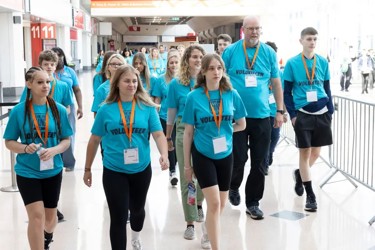
Jess Strudwick
Corporate Relationships Manager, EngineeringUK
Jess has always worked in the third sector and has been at EngineeringUK for nearly 2 years. She supports our lovely Members and partners to develop STEM outreach strategies. She loves collaborating with organisations to inspire the next generation of engineers and technologists. Jess has a passion for social and environmental sustainability. She enjoys gardening and is currently studying for a Masters in Sustainable Development.
Help! We need some guidance to inspire the next generation through volunteering
By Jess Strudwick, Corporate Relationships Manager, EngineeringUK
In response to requests from Corporate Members, Jess has pulled together lots of useful info to help volunteers get the most from their experience. She begins with the wider context, why volunteering matters, then highlights the benefits for all involved. Jess then suggests ideas for where to begin. Plus, there are lots of resources and guides to support. This is a great starting point if you’re thinking about volunteering or if you’re encouraging your team to use volunteering days. Experienced volunteers may find something new and be inspired to do something different.

Why volunteer?
Voluntary outreach activities allow young people to learn about the diverse range of career opportunities available in engineering. They can hear directly from individuals working in a STEM environment and learn about their journey. Often, volunteering gives young people opportunities to take part in STEM activities that showcase engineering skills.
The more interactions young people have with engineering professionals, the more they understand what engineers do. They're then more likely to consider a career in the sector.
We need more young people to realise that there could be a future for them in those careers. Many don't understand what the opportunities are and the different ways to get into them.
Seeing people who look like them, with similar backgrounds and interests as them, ‘real’ models – all play an important part inspiring the next generation. Volunteering allows organisations and individuals to support schools with STEM outreach activities they may not otherwise have access to (or be able to afford). Volunteering will provide skilled support and valuable personal insights of the industry to young people through engaging activities.
Inspire the next generation
School students who attend one or more STEM careers activities are:
- 3.5 times more likely to know what people in engineering do
- 3.4 times more likely to consider a career in engineering
The current landscape
We are experiencing immense workforce shortages in engineering and technology with demand continuing to increase in the sector. The latest Science Education Tracker highlights the current challenges:
- Only 12% of girls say being an engineer fits well with who they are
- Just 16% of girls think an engineering career is suitable for them
- Opportunities for practical science are particularly important for less engaged students
- Interest in science has declined and a gender gap has opened up
Volunteering benefits your organisation
Gen Z and millennials want organisations to be more responsible
75% of Gen Zs and millennials say that an organisation’s community engagement and societal impact is an important factor when considering potential employers. When employers respond positively, employee loyalty tends to be much higher among these generations, with millennials set to make up 75% of the workforce by 2025.
Employees feel the benefit
- Feel more connected/proud to work for the organisation – volunteering makes people prouder of the organisation they work for and improves company loyalty. It can create a sense of pride in the work that they do increases workforce satisfaction
- Skills development – volunteering creates an opportunity for individuals to build and develop leadership, presentation, project management and communication skills
- Sense of purpose – 86% of Gen Z and 89% of millennials say that having a sense of purpose in their work is very or somewhat important to their overall job satisfaction and well-being
- Networking – volunteering allows employers to connect with people across the organisation who they wouldn’t normally work with. Internal networking forms closer bonds within different teams. And at events such as The Big Bang Fair, volunteers come from many walks of life, allowing wider networking
How to make volunteering a success
- Make it easy for staff to take part – provide volunteers with guidance , resources and access to webinars so they have the tools to feel confident in delivering outreach activities
- Make opportunities inclusive – allow people from different areas of the business to take part and contribute in different ways. Recognise that a broader skill set from volunteers helps to showcase a range of career opportunities within the engineering sector
- Flexibility – volunteers want to feel reassured that they will be given the time to take part in outreach activities around working commitments. Make it as easy to take part as possible
What matters most to volunteers
- Enjoyment – the experience must be fun, rewarding, and enjoyable. Volunteers want to feel supported, be in a safe and welcoming environment
- Making a difference – volunteers want to know that what they are doing is making a positive difference and see evidence of the impact of the volunteering project
- Feeling connected – people want to feel part of the organisation and valued for what they do. Volunteers want to work towards a common objective and connect with people who believe in the same cause
Volunteering is for everyone
There are many types of volunteering to suit you and the time you have. From making a video case study on Neon, to getting stuck in at The Big Bang Fair. From delivering our Tackling Climate Change resource, to mentoring – there’ll be something with the right level of time commitment, effort and experience for you to get involved.
Lots of volunteering opportunities don’t require specific training, and EngineeringUK will always offer guidance for our activities. As a volunteer judge for The Big Bang Competition, for example, you’ll have a full online briefing and ongoing support from our experienced team.
Guidance and advice for volunteers
Here are lots of useful links, resource and materials to support you – whether you’re just starting or looking for different opportunities.
- Opportunities to get involved with EngineeringUK
- Top-tips document which gives advice on how to deliver inspiring engineering activities for young people, including case studies
- Watch this webinar on how to talk about engineering careers with young people
- The Meet the Future You quiz helps young people to find out how their skills and passions can lead to an exciting career in engineering
- Green engineering careers postcards for primary and secondary students show how people working in engineering and technology are working to achieve net zero and support environmental sustainability
- The 100 jobs in STEM highlights the exciting and varied career options that link with STEM
- This poster identifies 10 great reasons to become an engineer
- Learn about the different career routes in engineering for England, Scotland, Wales and Northern Ireland on EUK Education
- Use these This is Engineering posters to bring engineering roles to life for young people
- Use case studies to showcase different engineering roles and careers
- Access more resources on the Neon and Tomorrow’s Engineers websites
For STEM Ambassadors
- Read this useful volunteering guide for STEM Ambassadors
- Not a STEM Ambassador yet? Join the STEM Ambassador Community to get access to training, support and guidance
For Climate Ambassadors
- STEM Ambassadors can also specialise as Climate Ambassadors. Tackling Climate Change is the resource for them
For Enterprise Advisors
- Read this helpful guide to learn more about the role of an Enterprise Advisor
Further reading
3.5 x more
School students who attend one or more STEM careers activities are 3.5 times more likely to know what people in engineering do

3.4 x more
School students who attend one or more STEM careers activities are 3.4 times more likely to consider a career in engineering

Only 16%
of girls think engineering is suitable for them (vs. 44% of boys)

14%
of the engineering and tech workforce are from UK minority ethnic backgrounds





